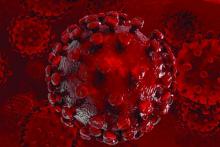A 9-year-old South African child treated with antiretroviral therapy (ART) for HIV infection for 40 weeks as an infant has been living with an undetectable level of the virus ever since without ART, researchers reported on July 24.
“To our knowledge, this is the first reported case of sustained control of HIV in a child enrolled in a randomized trial of ART interruption following treatment early in infancy,” said Avy Violari, MD, at the International AIDS Society Conference on HIV Pathogenesis and Treatment in Paris.
After HIV diagnosis at 1 month of age, the infant was enrolled in the Children with HIV Early Antiretroviral Therapy (CHER) clinical trial, funded by the National Institute of Allergy and Infectious Diseases. CHER randomized treatment to deferred ART or limited, early ART for 40 or 96 weeks.Starting with a high viral load at 9 weeks of age, the child’s treatment brought the viral load to undetectable levels and was halted after 40 weeks. Follow-up examinations and blood sampling over the next 8.5 years showed the child in good health, with only a small reservoir of virus in a tiny portion of immune cells, but a completely undetectable viral load by standard assays. The child’s immune system is healthy, and there are no symptoms of HIV infection.
“Further study is needed to learn how to induce long-term HIV remission in infected babies,” Anthony S. Fauci, MD, director of NIAID, said in an NIH news release about the case. “However, this new case strengthens our hope that by treating HIV-infected children for a brief period beginning in infancy, we may be able to spare them the burden of lifelong therapy and the health consequences of long-term immune activation typically associated with HIV disease.”


